|
|
|
Sort Order |
|
|
|
Items / Page
|
|
|
|
|
|
|
| Srl | Item |
| 1 |
ID:
096553
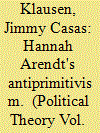

|
|
|
|
|
| Publication |
2010.
|
| Summary/Abstract |
This essay examines Arendt's descriptions of "Hottentots" in The Origins of Totalitarianism , especially the comparisons and contrasts she frequently draws between Hottentots and other peoples. In particular, Arendt highlights dehumanization of presumptively "civilized" people in comparing them to African "savages." Close reading of such analogies demands that we look beyond the racial explanations that other scholars have offered and focus instead on how Arendt's conception of humanity is bound up with a specific sense of culture that is antiprimitivist-exclusive of peoples without history, primitives. Analysis of her moral anthropology uncovers the Cape Colony discourses and postenlightenment German philosophical supports that inform her antiprimitivism. However, Arendt's antiprimitivism may not remain confined to Origins. In later essays, Arendt analyzes the various aspects of culture in instructive ways.Yet she also synthesizes culture concepts into a schema that introduces problems for her.
|
|
|
|
|
|
|
|
|
|
|
|
|
|
|
|
| 2 |
ID:
133514
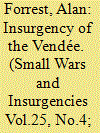

|
|
|
|
|
| Publication |
2014.
|
| Summary/Abstract |
The insurrection in the Vendée combined open warfare with the methods of petite guerre, ambushing French republican soldiers and cutting their supply lines to Paris. These tactics, when combined with the hatreds generated by a civil war, go far to explain to the cruelty of the conflict in the west and the depth of the hatreds it engendered. In republican eyes the use of guerrilla tactics was unjust and illegitimate, and they denounced their adversaries as common criminals and brigands, portraying them as backward, superstitious, even as subhuman, and in the process justified the savage repression they unleashed against them.
|
|
|
|
|
|
|
|
|
|
|
|
|
|
|
|
| 3 |
ID:
151154


|
|
|
|
|
| Summary/Abstract |
Recognition is vital for conflict resolution. This study was designed to learn more about the factors underlying the willingness to recognize the pain and suffering of the opponent in the asymmetrical protracted conflict between Israelis and Palestinians. Data were collected through a public opinion survey conducted with a representative sample of Israeli-Jewish adults (N = 511). Perceptions of threat/distrust toward Palestinians and dehumanization of Palestinians each made a significant contribution to explaining Jewish-Israeli (un)willingness to recognize Palestinian pain and suffering (R2 = .36). Hawkishness made an added significant contribution to the overall explanatory power of the model (R2 = .38). Higher scores on the threat/distrust scale and the dehumanization scale, as well as higher hawkishness predicted decreased willingness to recognize Palestinian pain and suffering. The implications of our findings for understanding the role of recognition and of moral concern in conflict resolution are discussed.
|
|
|
|
|
|
|
|
|
|
|
|
|
|
|
|
| 4 |
ID:
134992
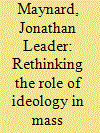

|
|
|
|
|
| Summary/Abstract |
There is a widespread sense amongst theorists of genocide and other violent atrocities that ideology matters. But in spite of this agreement all is not well with actual efforts to theorise ideology's role. Theoretical and empirical coverage has been uneven, and there has been little if any effort to incorporate theories and research from the actual specialist field of contemporary ideology studies. As a result, overarching theoretical accounts of the role ideology plays in violent atrocities remain limited and problematic. This article aims to encourage theorists to think about ideology in a more systematic and productive fashion by analysing four questions: (a) what do we mean by ideology?; (b) who, in cases of atrocity, might be relevantly affected by ideology?; (c) how do these people come to be influenced by atrocity-justifying ideologies?; and (d) how might ideology encourage these people to commit, or permit, mass violence? In discussing these four questions, I aim to clear up a number of misconceptions or vagaries that frequent current analyses of ideology in works on atrocity and political violence. I ultimately offer a suggestive account of six recurring “justificatory mechanisms” which collectively describe some of the common features of ideology's role across cases of mass atrocity.
|
|
|
|
|
|
|
|
|
|
|
|
|
|
|
|
| 5 |
ID:
080823
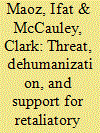

|
|
|
|
|
| Publication |
2008.
|
| Summary/Abstract |
Public opinion can permit or encourage retaliatory aggressive state policies against vulnerable but threatening out-groups. The authors present a model in which public support for such policies is determined by perceived threat from and dehumanization of the target group. This two-factor model predicts Israeli Jews' support for two retaliatory aggressive policies: the more hypothetical notion of Palestinian population transfer and concrete, coercive actions toward Palestinians. The authors find (1) that threat and dehumanization are distinct constructs, each having unique contributions to explaining support for aggressive retaliatory policies, (2) that threat and dehumanization significantly explain support for aggressive retaliatory policies when respondents' hawkishness, socioeconomic status (SES), and education level are taken into account, and (3) that the association of hawkishness and SES with support for aggressive retaliatory policies is largely mediated by threat perception. Results are highly consistent across two studies, suggesting the two-factor model may be useful for understanding support for aggressive action in situations of asymmetric conflict
|
|
|
|
|
|
|
|
|
|
|
|
|
|
|
|
| 6 |
ID:
125313
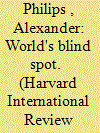

|
|
|
|
|
| Publication |
2013.
|
| Summary/Abstract |
Children starve. Young girls sell their bodies to eat. There is no clean drinking water. There are no doctors. Refugees are not allowed to leave the camps. As the rainy season approaches, waterborne diseases will spread like wildfire. This is the plight of the over 200,000 Rohingya who survive in makeshift refugee camps along the Myanmar's border with Bangladesh. Although their situation is dire, they are better off than the Rohingya being slaughtered back in Myanmar. According to the United Nations, the Rohingya are the world's most ignored and persecuted minority. They have faced decades of neglect and dehumanization while the world stands by; it is time for the response of the international community to change. The situation in Myanmar has reached a tipping point and the country is a tinderbox, ready to ignite into violence. The inaction of the international community has allowed the persecution of the Rohingya Muslim minority to escalate into state-sponsored ethnic cleansing and a spreading humanitarian crisis in Myanmar's western Rakhine state
|
|
|
|
|
|
|
|
|
|
|
|
|
|
|
|
|
|
|
|
|